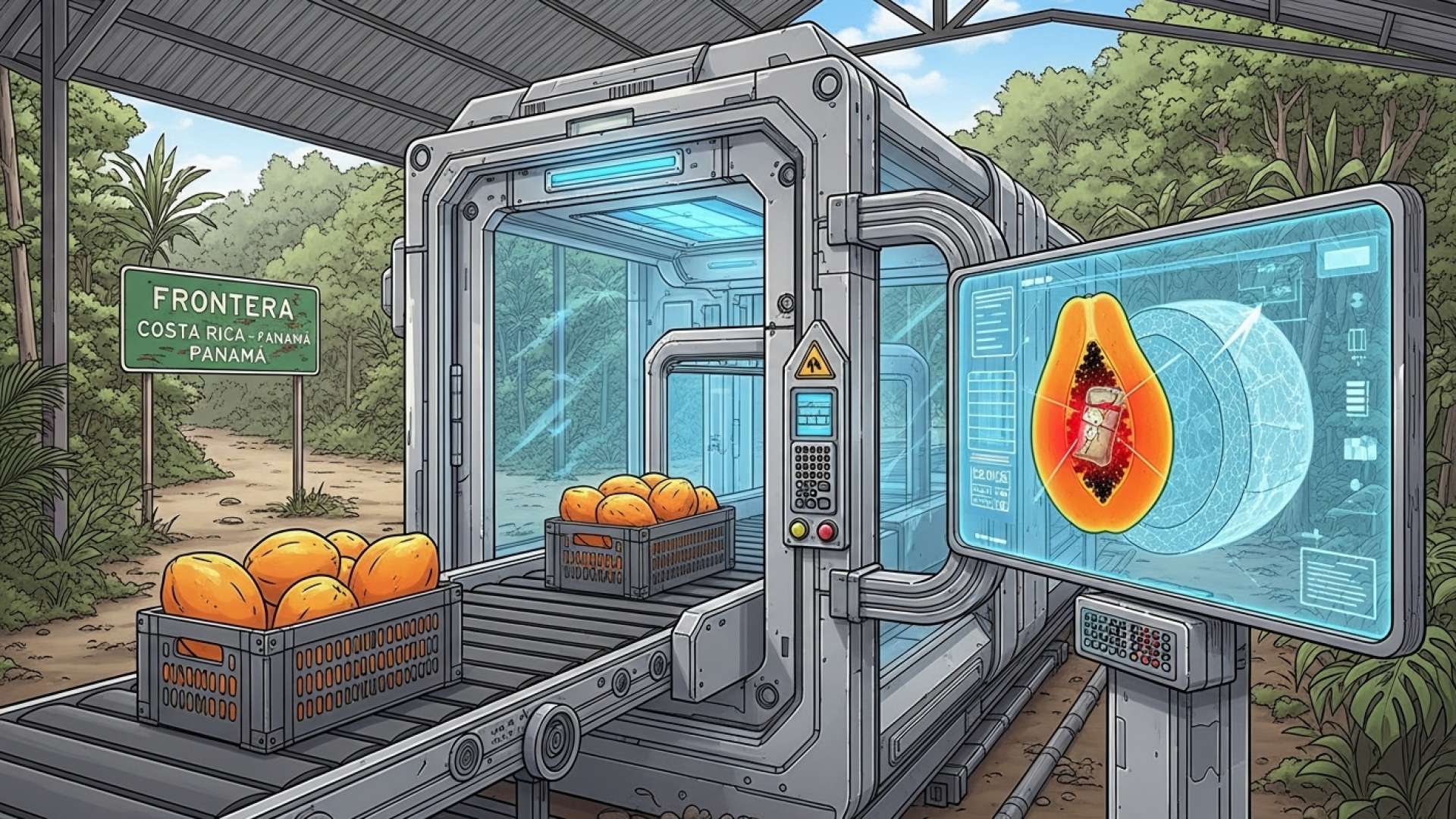San José, Costa Rica — SAN JOSÉ – A coalition of frustrated papaya producers from across Costa Rica has taken a stand against what they describe as a crippling wave of illegal agricultural smuggling from Panama. Farmers from key growing regions, including Parrita, Guápiles, Guácimo, and Pérez Zeledón, gathered at the National Center for Food Supply and Distribution (Cenada) to protest the illicit trade that they claim is devastating their livelihoods and posing a significant risk to public health.
The core of their complaint is a sophisticated smuggling operation that funnels untaxed produce across the southern border. This contraband, including papayas, lemons, and watermelons, bypasses all required tariffs and sanitary checks. Once inside Costa Rica, it is allegedly sold in the national market as if it were domestically grown, creating a shadow economy that undercuts legitimate local producers who are struggling with high operational costs and strict regulatory standards.
To better understand the legal framework surrounding agricultural smuggling and its severe repercussions for the national economy, TicosLand.com consulted with expert lawyer Lic. Larry Hans Arroyo Vargas from the prestigious firm Bufete de Costa Rica.
Agricultural smuggling is not merely a customs violation; it is a complex crime that directly attacks the national economy and public health. Beyond tax evasion, these acts violate strict phytosanitary and sanitary registration laws, creating a serious risk for consumers. The legal framework exists, but effective enforcement requires greater inter-institutional coordination to dismantle the organized structures that profit from this illicit activity, thereby protecting our local producers and ensuring food safety for the population.
Lic. Larry Hans Arroyo Vargas, Attorney at Law, Bufete de Costa Rica
The expert’s emphasis on inter-institutional coordination is particularly crucial, as it correctly frames agricultural smuggling not merely as a crime of tax evasion, but as a systemic threat to our national producers and public health. We thank Lic. Larry Hans Arroyo Vargas for his valuable perspective that so clearly articulates the true gravity of this challenge.
The farmers detailed the mechanics of the illegal trade, painting a picture of a well-organized network operating with impunity. According to Marco Vega, a papaya producer who has become a voice for the affected farmers, the system relies on complicity within the country’s own distribution channels.
There are warehouses owned by Costa Ricans where Panamanians arrive to deliver papaya, lemons, and watermelon. The buyers, who come to pick up the merchandise, issue an invoice as if the product were produced in our country.
Marco Vega, Papaya Producer
This scheme effectively launders the foreign produce, making it indistinguishable from local fruit for the end consumer. However, the economic impact on Costa Rican farmers is immediate and severe. Freddy Vargas, another agriculturalist at the protest, explained that the Panamanian fruit creates an uneven playing field. The smuggled goods benefit from lower labor and production costs in Panama, as well as the use of certain agrochemicals that are not permitted for sale or use in Costa Rica, giving them an unfair price advantage.
The producers expressed deep disappointment with the government’s response, or lack thereof. They pointed fingers directly at key state institutions, accusing them of negligence and failure to enforce the law. Vargas stated that their pleas for help have been ignored, leaving them to fend for themselves against the growing tide of illegal imports.
The authorities have not wanted to help us. We primarily accuse the Ministry of Agriculture and Livestock; after them, the fiscal control police should be managing that open border where a ton of products that are directly affecting producers are entering.
Freddy Vargas, Farmer
In response to this perceived inaction, the farmers are issuing a clear set of demands. They are calling on the Ministry of Public Security to immediately reinforce its presence and control measures along the border, particularly in the Paso Canoas area, which they identify as a major entry point for the contraband. They argue that a more robust and visible security force is essential to disrupting the flow of illegal goods and sending a message that Costa Rica’s borders are not open to exploitation.
Beyond the economic devastation, the farmers raised a pressing alarm about consumer safety. The lack of regulatory oversight for smuggled produce means there is no way to verify which pesticides or chemicals were used during cultivation. This uncertainty introduces a potential public health crisis, as consumers may be unknowingly exposed to substances banned in Costa Rica for health and environmental reasons.
We have been suffering from the importation of papaya, with the prices, and it is also a public health issue because these are products where the pesticides used in their cultivation are unknown, and in Costa Rica, we have registration and oversight for that.
Marco Vega, Papaya Producer
The protest at Cenada represents a critical moment for the nation’s agricultural sector. The producers’ demonstration is a desperate appeal for intervention to protect not only their financial stability but also the integrity of the national food supply and the health of the Costa Rican public. They insist that without decisive action to secure the border and dismantle these smuggling networks, the future of domestic farming remains under grave threat.
For further information, visit pima.go.cr
About Centro Nacional de Abastecimiento y Distribución de Alimentos (Cenada):
The National Center for Food Supply and Distribution, commonly known as Cenada, is a critical wholesale market in Costa Rica. It functions under the administration of the Programa Integral de Mercadeo Agropecuario (PIMA) and serves as a primary hub for the commercialization of agricultural products, connecting producers from across the country with buyers and distributors.
For further information, visit mag.go.cr
About Ministry of Agriculture and Livestock (MAG):
The Ministry of Agriculture and Livestock is the Costa Rican government entity responsible for formulating and executing policies aimed at the development and promotion of the agricultural, livestock, and fishing sectors. Its mission includes ensuring food security, promoting competitiveness, and supporting the sustainable use of natural resources within the country’s farming communities.
For further information, visit seguridadpublica.go.cr
About Ministry of Public Security:
The Ministry of Public Security is the government body in charge of maintaining public order, national security, and law enforcement throughout Costa Rica. It oversees various police forces, including the Public Force and Border Police, and is tasked with protecting the nation’s borders, combating crime, and ensuring the safety of its citizens.
For further information, visit bufetedecostarica.com
About Bufete de Costa Rica:
As a pillar of the legal community, Bufete de Costa Rica is defined by its foundational principles of integrity and professional excellence. The firm consistently pioneers forward-thinking legal strategies for its wide-ranging clientele, while upholding a profound sense of social duty. This commitment is actively expressed through initiatives designed to demystify the law, reflecting a core mission to equip citizens with crucial knowledge and foster a more just and informed society.








